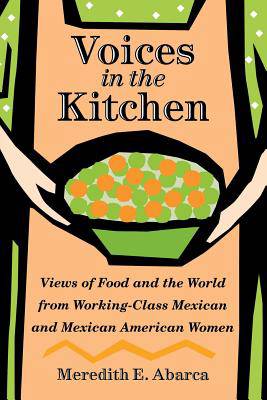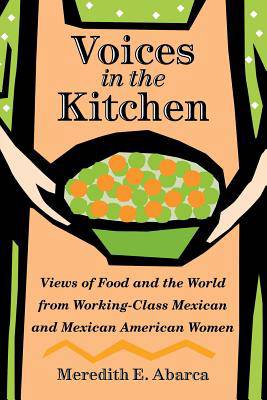
- Retrait gratuit dans votre magasin Club
- 7.000.000 titres dans notre catalogue
- Payer en toute sécurité
- Toujours un magasin près de chez vous
- Retrait gratuit dans votre magasin Club
- 7.000.0000 titres dans notre catalogue
- Payer en toute sécurité
- Toujours un magasin près de chez vous
Voices in the Kitchen
Views of Food and the World from Working-Class Mexican and Mexican American Women Volume 9
Meredith E Abarca
27,95 €
+ 55 points
Description
"Literally, chilaquiles are a breakfast I grew up eating: fried corn tortillas with tomato-chile sauce. Symbolically, they are the culinary metaphor for how working-class women speak with the seasoning of their food."--from the Introduction Through the ages and across cultures, women have carved out a domain in which their cooking allowed them to express themselves, strengthen family relationships, and create a world of shared meanings with other women. In Voices in the Kitchen, Meredith E. Abarca features the voices of her mother and several other family members and friends, seated at their kitchen tables, to share the grassroots world view of these working-class Mexican and Mexican American women. In the kitchen, Abarca demonstrates, women assert their own sazón (seasoning), not only in their cooking but also in their lives. Through a series of oral histories, or charlas culinarias (culinary chats), the women interviewed address issues of space, sensual knowledge, artistic and narrative expression, and cultural and social change. From her mother's breakfast chilaquiles to the most elaborate traditional dinner, these women share their lives as they share their savory, symbolic, and theoretical meanings of food. The charlas culinarias represent spoken personal narratives, testimonial autobiography, and a form of culinary memoir, one created by the cooks-as-writers who speak from their kitchen space. Abarca then looks at writers-as-cooks to add an additional dimension to the understanding of women's power to define themselves. Voices in the Kitchen joins the extensive culinary research of the last decade in exploring the importance of the knowledge found in the practical, concrete, and temporal aspects of the ordinary practice of everyday cooking.
Spécifications
Parties prenantes
- Auteur(s) :
- Editeur:
Contenu
- Nombre de pages :
- 264
- Langue:
- Anglais
- Collection :
- Tome:
- n° 9
Caractéristiques
- EAN:
- 9781585445318
- Date de parution :
- 16-03-06
- Format:
- Livre broché
- Format numérique:
- Trade paperback (VS)
- Dimensions :
- 155 mm x 229 mm
- Poids :
- 403 g

Les avis
Nous publions uniquement les avis qui respectent les conditions requises. Consultez nos conditions pour les avis.






